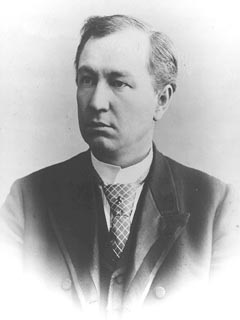John E. Kenna facts for kids
Quick facts for kids
John E. Kenna
|
|
|---|---|
 |
|
| United States Senator from West Virginia |
|
| In office March 4, 1883 – January 11, 1893 |
|
| Preceded by | Henry G. Davis |
| Succeeded by | Johnson N. Camden |
| Member of the U.S. House of Representatives from West Virginia's 3rd district |
|
| In office March 4, 1877 – March 3, 1883 |
|
| Preceded by | Frank Hereford |
| Succeeded by | Charles P. Snyder |
| Personal details | |
| Born | April 10, 1848 Kanawha County, Virginia (now West Virginia) |
| Died | January 11, 1893 (aged 44) Washington, D.C. |
| Political party | Democratic |
| Signature | |
John Edward Kenna (April 10, 1848 – January 11, 1893) was an American politician. He served as a Senator for West Virginia from 1883 until his death. He worked hard to help his state grow and supported important changes in the government.
John Kenna's Early Life
John Kenna was born in Kanawha County, Virginia. This area is now part of West Virginia, near the city of St. Albans. He grew up in a place called Upper Falls. His father worked there as a lockmaster and owned a sawmill. John didn't get much formal schooling.
When he was 16, John joined the "Iron Brigade" with General Joseph O. Shelby. He served in the Confederate States Army and was wounded during his service. After returning home, he studied law on his own. He passed his law exams in 1870 and became a lawyer. He quickly became very active in the Democratic Party in West Virginia.
Rising in Politics
John Kenna started his political career in 1872. He became the prosecuting attorney for Kanawha County. Later, in 1875, he served as a temporary judge for the county circuit court. In 1876, he was elected to the United States House of Representatives.
While in the House, he strongly supported laws about railroads. He also worked to get help for "slack-water navigation." This was a way to make rivers easier for boats to travel on. This helped the coal, timber, and salt industries in West Virginia. These efforts helped him earn a seat in the United States Senate in 1883. In the Senate, he continued to fight for these important causes.
Senate Leadership and Legacy
In the Senate, Kenna became the minority leader for the Democratic Party. He was known as a powerful speaker. He strongly defended President Grover Cleveland on several issues. He also criticized the Republican majority in the Senate. He believed they were not doing enough to change tariff laws.
Kenna was a practicing Catholic. He was a member of the church at St. Joseph's on Capitol Hill in Washington, D.C.. His political career ended suddenly when he died at the age of 44 on January 11, 1893.
The town of Kenna, West Virginia is named after him. In 1901, West Virginia gave a marble statue of Kenna to the U.S. Capitol. This statue is part of the National Statuary Hall Collection.

